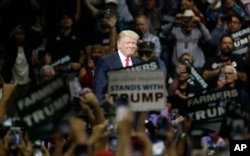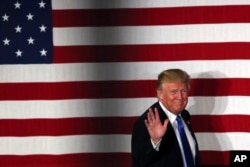Donald Trump clinched the 1,237 delegates needed to become the Republican presidential nominee Thursday — a feat that seemed almost impossible just a few months ago. Now, despite the wishes of the Republican establishment, Trump is working to remake the party in his own image.
Trump’s no-holds-barred style and high-energy delivery attracted a record number of voters to cast ballots in the Republican primary race, but the same qualities that rocketed Trump to the nomination have created a rift between party elites and the voters who support him.
“You see the reaction of someone like former Governor [Jeb] Bush, who out of frustration, is waving his arms saying ‘alright, fine, if that’s what you want, go take Trump. There’s this sense of exasperation that exists within the mainstream of the party, ‘we can’t control this, what can we do about this?’” said Mark Rozell, dean of George Mason University’s school of policy, government and international affairs.
Trump’s task moving forward is to reconcile the wishes of the Republican establishment with the interests of his new followers.
“The simple explanation is that party leaders and insiders care first and foremost about winning elections and holding power. The hardcore activists that participate in the primaries and caucuses often are not thinking about who is the most viable candidate — who has the best chance of winning — they want to see ideological purity,” said Rozell.
From #NeverTrump to #NeverHillary
Trump spent the majority of primary season railing against the Republican donor class and the politicians he said were beholden to it. But now that Trump has pivoted into the general election, he will be forced to work with some of those same big-money donors if he is to stay competitive in what will likely be the most expensive election in U.S. history.
Winning over those donors may prove challenging for Trump, as many don’t trust him and don’t see eye to eye with his policy proposals. A recent New York Times analysis shows that at least a dozen of the GOP’s wealthiest and most reliable donors have vowed to never give money to the New York real estate mogul. Combined, that group has contributed $90 million to Republicans in the last three elections.
One of those donors, hedge fund manager William Oberndorf, told the Times if the election comes down to Trump versus Clinton, which appears increasingly likely, “I’ll be voting for Hillary.”
While these donors are disavowing Trump, political expediency is leading others to jump onboard with the Republican nominee. At least nine of the GOP’s top donors have already given money to Trump, according to the Times. They may not like everything Trump says, but the alternative is far more frightening for them.
"Like many of you, I do not agree with him on every issue. However, I will not sit idly by and let Hillary Clinton become the next president," casino executive Sheldon Adelson wrote in a recent letter to fellow board members of the Republican Jewish Coalition.
Falling in line
Trump has secured the endorsements of dozens of sitting senators and congressmen, as well as high-rollers within the party, including former Vice President Dick Cheney and Sheldon Adelson, one of the GOP’s wealthiest donors.
Several of Trump’s former primary opponents, who heavily criticized him during the campaign, now are actively working with him.
New Jersey Governor Chris Christie was tapped by Trump to lead his presidential transition team. Trump chose Dr. Ben Carson to head up his vice presidential selection committee. Senators Rand Paul and Marco Rubio both said they'll honor their pledge to support the GOP nominee.
Trump’s real appeal, though, doesn’t lie with the Republican base, but with those outside the party, who are turning out for Trump in large numbers.
“As far as we can tell from looking at the electorate, it’s not people that identify really strongly as Republicans who are the strongest Trump supporters,” Tom Ogorzalek, assistant professor of political science at Northwestern University told VOA.
“They might be the most conservative on some issues, but a lot of them tend to be even registered as Democrats — maybe that registration is pretty old — or they’re kind of weak Republican identifiers.”
New Republican Party
Ogarzalek said that moving forward, the party will be largely led by the southern Republicans who identify most strongly with Trump’s populist appeal, and will see a “vanishing of northeastern Republicans,” which used to be the heart of the party.
“I think they’ll probably have a good shot at maintaining the majority they have in the House,” he said, but warned if the party doesn’t work to become more inclusive of America’s increasingly diverse population it could become irrelevant.
“Things like marriage equality are definitely a loser for them. Basically all of the states have changed to have majorities in favor of it. So arguing strongly that they would overturn marriage equality with a constitutional amendment is probably not a total winner,” said Ogarzalek.
Trump agrees, and it appears he has his own vision for the future, though it’s not exactly in line with the Republican Party of years past. He told Bloomberg News in five or 10 years the GOP will be a “different party.”
“You’re going to have a worker’s party. A party of people that haven’t had a real wage increase in 18 years, that are angry,” said Trump. “What I want to do, I think cutting Social Security is a big mistake for the Republican Party. And I know it’s a big part of the budget. Cutting it the wrong way is a big mistake, and even cutting it [at all].”
Trump has avoided many of the conservative social pitfalls that plagued his rivals during the campaign, including the issues of gay marriage and bathroom access for transsexual people, which he has, on both fronts, voiced support for.
Instead, Trump has focused his campaign heavily on economic issues and border security — to the dismay of party leaders.
'Autopsy report'
In March 2013, the GOP released its so-called “autopsy report” following Mitt Romney’s blow-out loss to President Barack Obama. The document listed several steps Republicans needed to take to get back into the White House in the future, chief among them being outreach to ethnic minority voters and women.
“If Hispanic Americans perceive that a GOP nominee or candidate does not want them in the United States [i.e. self-deportation], they will not pay attention to our next sentence,” the document reads. “It does not matter what we say about education, jobs or the economy; if Hispanics think we do not want them here, they will close their ears to our policies.”
Trump has done the opposite of what the GOP document suggested, and instead made building a wall along the U.S. border with Mexico and deporting illegal aliens two of his most prominent campaign promises — proposals that has ostracized many in the Hispanic community.
He faces similar issues with women, whom the document said “should be part of all activities that the RNC [Republican National Committee] undertakes.”
Trump, instead of heeding the advice of GOP leadership, repeatedly has attacked Hillary Clinton with what some would consider sexist remarks. At a news conference last month, Trump accused Clinton of playing “the women’s card” and said, “If Hillary Clinton were a man, I don’t think she’d get five percent of the vote.”
He also infamously retweeted one of his Twitter followers who called Fox News host Megyn Kelly a “bimbo.”
Demographic issues
These demographic issues could prove a major hurdle to overcome in his bid to win the presidency.
A recent Fox News polls shows that 74 percent of Latino voters hold an unfavorable view of Trump, while a recent ABC News/Washington Post poll shows Clinton, the presumptive Democrat nominee, with a 14-point lead over Trump among women.
There is, however, a silver lining for Trump — his poll numbers keep going up. Two months ago, the same poll showed Clinton with a 21 point lead over Trump among women. Meanwhile, Trump’s support among men rose by 17 points since March.
A Real Clear Politics average of polling data shows Trump and Clinton neck and neck in a general election match-up, each with about 43 percent of the vote. Two months ago, the same average showed Clinton beating Trump by 12 points.






